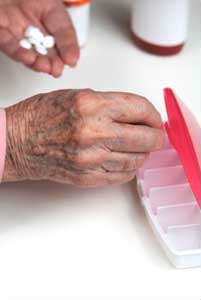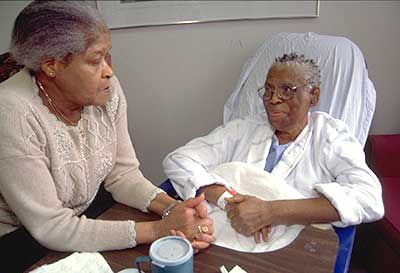Completion requirements
View
Introduction

- About one-third of all prescribed medications are taken by older adults. On average, older people take five to seven different medications each day. Fewer than 5% are on no medications at all.
- The use of medications is important to treat and prevent diseases in older people, but they also have the potential to cause adverse effects.
- Adverse effects to medications are more common in older adults for many reasons, such as:
- Physical changes caused by aging affect the way the body handles medications.
- Older adults take several prescribed medications in addition to medications that do not need a prescription.
- Compliance with medication intake can be challenging when taking several different medications.
- Caregivers can play an important role in ensuring that their family members take medications as prescribed and in a safe manner.
What You Should Know
Changes with Aging and Medication Use

- As people grow older, there are changes in body composition, such as decreased body water, less lean muscle, and more body fat. There are also changes in how the liver and kidney function. These changes affect the way the body uses medications, for example:
- The liver is less effective breaking down drugs so that they can be eliminated from the body.
- The kidney is less effective eliminating drugs or their waste products, which can build-up and lead to side effects and adverse reactions.
- There is a decrease in albumin production. Albumin is a carrying-protein which binds itself to many drugs. Because there is less circulating albumin to bind to, more drug is freely available in the body.
- Body tissue changes make older people less able to handle the effects of a medication. As a result, what may be a very mild side effect in younger adults, might be very severe in an older person. For example, blood pressure medications, sleeping pills, and water-pills can cause dizziness, poor balance, and falls.
- As a result of these body changes, health care providers need to adjust the drug dosage when prescribing medications for older people.
Non-Compliance
- Non-compliance means not following the instructions about how a medication should be taken. Non-compliance can involve overuse, under-use, erratic use, or combining a medication with alcohol.
- Up to 50% of older individuals are considered non-compliant.
- The result of non-compliance is more frequent physician visits, hospitalizations, and laboratory tests.
- There are many reasons for non-compliance with medications, these can be divided into four distinct categories:
- o Individual characteristics – memory loss, reduced vision or hearing, lack of social support.
- o Communication – lack of familiarity with the language, not being able to understand the instructions on how to take the medication
- o Medication related - having difficulty with the container, other names given to the medication (for example the commercial name) or having difficulty understanding the label instructions.
- o The health care system – having more than one physician, health care provider, and pharmacist.
Polypharmacy

- Polypharmacy is the use of more medications than are required to treat or prevent disease. It often involves the use of prescribed medications in combination with several drugs that do not require a prescription (also known as over-the-counter products).
- Polypharmacy often complicates the treatment of a disease and has become a significant problem in the care of older adults.
- Several factors can lead to polypharmacy, including:
- increasing age
- numerous symptoms
- multiple medical conditions
- too many prescribers (e.g., physicians, nurse practitioners, pharmacists)
- lack of a family member to coordinate drug treatment
- multiple drug stores
- changes in instructions
- drug hoarding
- self-treatment
Medication Management
- Proper management of your family member's medications is an important feature of good care. Here are some suggestions for caregivers.
- Know your family member's strengths and weaknesses.
- Make an accurate medication list and keep it up to date.
- Have your family member's health care provider review the list.
- If multiple medications are being taken, have the pharmacist package the doses together.
- Minimize drug taking.
- Improve compliance if possible.
- Collaborate and coordinate with your health care provider and pharmacist.
- Educate yourself and your family member about the medications they are taking.
When to Seek Medical Advice
Adverse Drug Reactions

- An adverse drug reaction is defined as an unintended, harmful response to a drug that occurs when the drug is given at a usual dose to treat or prevent a disease.
- It is estimated that as many as one-fifth of hospital admissions are due to adverse drug reactions.
- It is important to recognize some of the problems that some medications are more likely to cause when given to older adults, for example:
- Anti-cholinergic effects: These occur with some antipsychotic medications, certain antidepressants, medications for Parkinson’s disease, and antihistamines. They usually result in dry mouth, blurred vision and difficulty urinating; but they can also result in more serious adverse effects such as confusion, agitation, and hearing or seeing things that are not there.
- Pain relievers, especially narcotics such as morphine. These can cause stomach upset such as nausea and vomiting, constipation, drowsiness, and confusion. They can also result in addiction.
- Anti-inflammatory medications can cause stomach ulcers and bleeding, kidney failure, and confusion.
- Anti-psychotic medications can also cause drowsiness, changes in blood pressure, and muscle stiffness that can increase the risk of falls.
- Sleeping pills such as valium-like drugs can result in sedation, confusion, and falls. Once started, they can be very difficult to stop; and prolonged use usually requires higher doses to achieve the same therapeutic effect.
- Blood-thinners can cause serious bleeding problems. Blood tests are done to ensure they are being taken in proper dosage.
- Consult with your health care provider
- If the change in your family member's condition is very mild, contacting your family physician or health care provider is the best route to follow.
- Consult your pharmacist if you are concerned about any of the adverse drug reactions listed above or if any other problems with the medications arise.
- If you are receiving Home Care, you could also telephone the Home Care nurse if significant drowsiness, seizures, bleeding, or altered behaviour arise.
- Go to Emergency
- If symptoms occur after a recent change in medication or drug dosage, do not delay; proceed immediately to the nearest Emergency Department.
Last modified: Wednesday, 27 April 2022, 9:23 AM